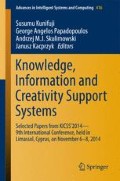Abstract
Cost and social dimensions are now being added to the existing environmental Life Cycle Assessment (LCA), leading to Life Cycle Sustainability Assessment (LCSA). LCSA is very complex with deep uncertainties and, generally, involves several stakeholders. Therefore, the analysis and interpretation of the outputs of LCSA is a difficult and complex task, requiring aggregation of preferences. The work in progress here presented deals with a study regarding the use of open exchange interactive software packages dedicated to Multi-criteria decision aiding in the context of LCSA output analysis and interpretation.
Access this chapter
Tax calculation will be finalised at checkout
Purchases are for personal use only
References
Sen, A: Idea of Justice. Harvard University Press, Cambridge (2011)
Our Common Future–Report of the World Commission on Environment and Development: United Nations (1987)
Zamagni, A., Pesonen, H.L., Swarr, T.: From LCA to life cycle sustainability assessment: concept, practice and future directions. Int. Life cycle Assess. 18, 1637–1641 (2013)
Reap, J., Roman, F., Duncan, S., Bras, B.: A survey of unresolved problems in life cycle assessment–part 2: impact assessment and interpretation. Int. J. Life Cycle Assess. 13, 374–388 (2008)
Mazri, C., Ventura, A., Jullien, A., Bouyssou, D.: Life cycle analysis and decision aiding: an example of roads evaluation. http://sciencestage.com/d/1093635/life-cycle-analysis-and-decision-ainding-an-example-for-roads-evaluations-.html
Mietinen, P., Hamailainen, R.P.: How to benefit from decision analysis in environmental life cycle assessment (LCA). EJOR 102, 279–294 (1997)
Benoit, V., Pousseaux, P.: Aid for aggregating the impacts in life cycle assessment. Int. J. Life Cycle Assess. 8, 74–82 (2003)
Huppes, G., von Oers, L., Pretato, U., Pennington, D.: Weighting environmental effects: analytic survey with operational evaluation methods and a meta-method. Int. J. Life Cycle Assess. 17, 876–891 (2012)
Cinelli, M., Coles, S., Kirwan, K.: Use of multicriteria decision analysis to support life cycle sustainability assessment: an analysis of the appropriateness of the available methods. In: 6th International Conference on Life Cycle, Gothenburg (2013)
Halog, A., Manik, Y.: Advancing integrated systems modeling framework for life cycle sustainability assessment. Sustainability 3, 469–499 (2011)
Benetto, E., Dujet, C.: Uncertainty analysis and MCDA; A case study in life cycle assessment (LCA) practice. In: Proceedings of the 57th Meeting of the European Working Group on Multicriteria Decision Aiding. Viterbo (2003)
Dias, L., Clímaco, J.: Additive aggregation with interdependent parameters: the VIP analysis software. JORS 51, 1070–1082 (2000)
Clímaco, J., Fernandes, S., Captivo, M.E.: Classificação MultiAtributo Suportada por uma Versão Interactiva do Método Conjuntivo (An Interactive version of the Conjunctive Method dedicated to Multiattribute Classification Problems). CIO—Working Paper 9 (2011)
Clímaco, J., Craveirinha, J.: Multi-actor multidimensional quality of life and sustainable impact assessment—discussion based on a new interactive tool. In: Proceedings of GDN 2013, Sweden (2013)
Valle, R., Clímaco, J.: Green economy in the state of rio de janeiro—a non-compensatory multidimensional interactive evaluation. In: XXII MCDM Conference, Malaga (2012)
Figueira, J., Mousseau, V.,Roy, B.: ELECTRE Methods, Multiple Criteria decision Analysis: State of the Art Surveys. In: Figueira, J., Erghot, M., Greco, S., Springer (2005)
Duarte, S.: Social impacts identification and characterization tool (SIICT): proposal and application for social LCA. SAGE/COPPE/UFRJ Internal Report (2014)
United Nations Environment Programme (UNEP). Guidelines for social life cycle assessment of products. Paris (2009)
Author information
Authors and Affiliations
Corresponding author
Editor information
Editors and Affiliations
Rights and permissions
Copyright information
© 2016 Springer International Publishing Switzerland
About this paper
Cite this paper
Clímaco, J.C.N., Valle, R. (2016). MCDA and LCSA—A Note on the Aggregation of Preferences. In: Kunifuji, S., Papadopoulos, G., Skulimowski, A., Kacprzyk , J. (eds) Knowledge, Information and Creativity Support Systems. Advances in Intelligent Systems and Computing, vol 416. Springer, Cham. https://doi.org/10.1007/978-3-319-27478-2_8
Download citation
DOI: https://doi.org/10.1007/978-3-319-27478-2_8
Published:
Publisher Name: Springer, Cham
Print ISBN: 978-3-319-27477-5
Online ISBN: 978-3-319-27478-2
eBook Packages: EngineeringEngineering (R0)

